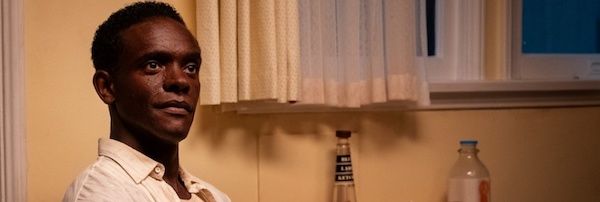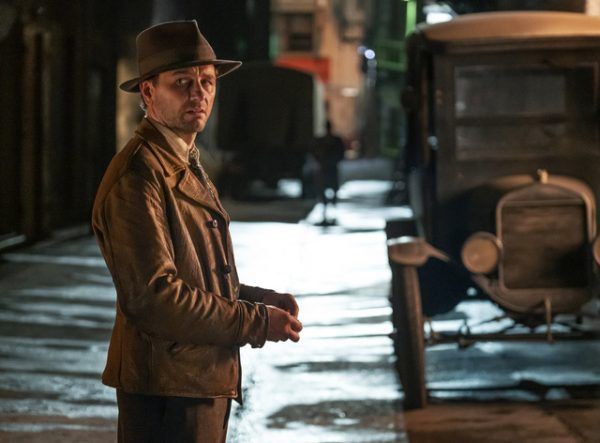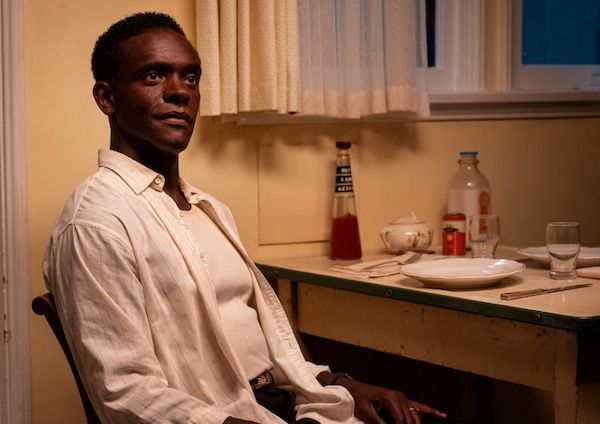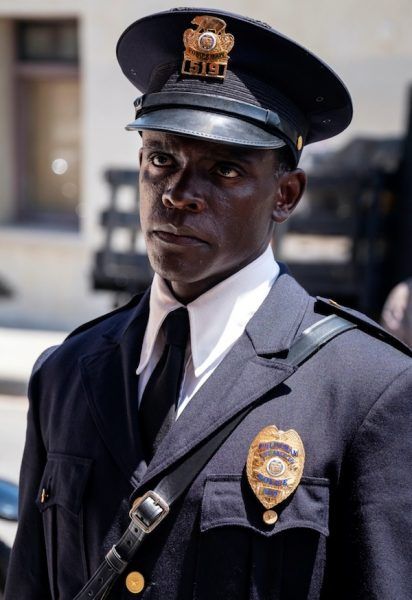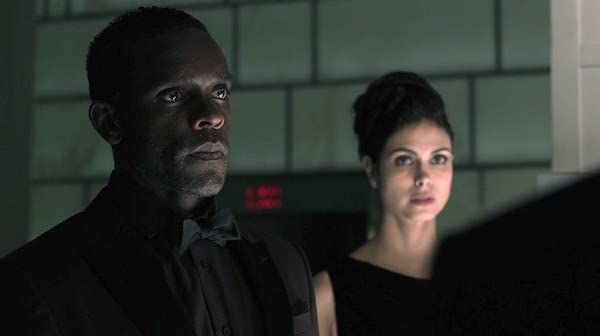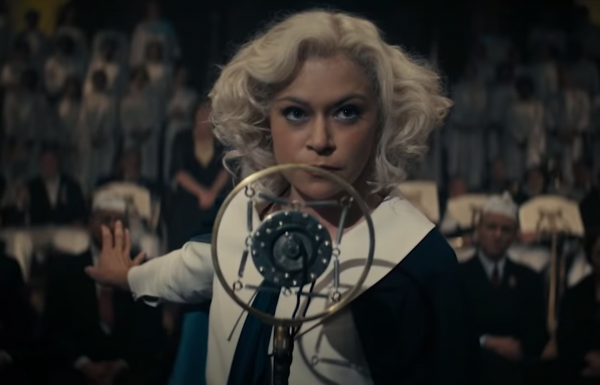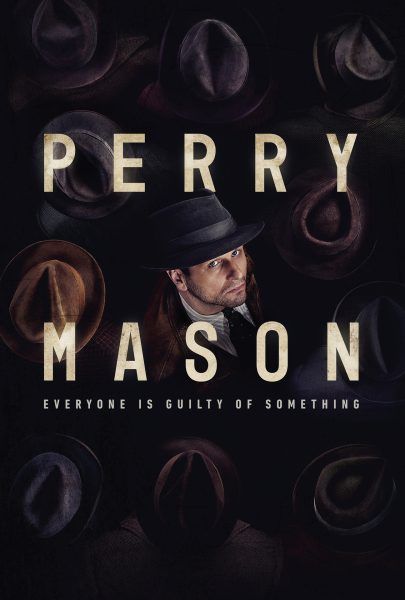From showrunners Ron Fitzgerald & Rolin Jones, and executive produced by Robert Downey Jr. & Susan Downey, the HBO limited series Perry Mason is set in 1931 Los Angeles with Perry Mason (Matthew Rhys) as a PI that’s struggling to make ends meet. When the case of a kidnapped one-year-old with a $100,000 ransom comes his way, Mason turns to his right-hand man Pete Strickland (Shea Whigham), attorney E.B. Jonathan (John Lithgow) and E.B.’s legal secretary Della Street (Juliet Rylance), for help in answering the growing list of questions surrounding the crime.
During a very insightful 1-on-1 chat with Collider, actor Chris Chalk — who plays Officer Paul Drake, a beat cop with a gift for investigative work which upsets the racist and corrupted police department where he works — speaks about what attracted him to this project, the process of making Paul Drake a Black man in the 1930s, playing someone whose biggest flaw is being a good person, why he’d like to continue to play this character, and much more.
COLLIDER: I’ve been enjoying this show very much, and it’s just absolutely gorgeous to look at.
CHRIS CHALK: Oh, I love it. Isn’t it beautiful? My wife and I were going to see a movie and we happened to run into one of the editors on Sunset, and he was like, "Hey, we just moved our editing suite. It’s right down over here," and we went and saw Episode 7, just randomly. The director, Tim [Van Patten], just happened to be there. I was like, “Oh, my god, this is beautiful.” The first thing I saw, I was like, "Yo, these people know what they’re doing." I remember Tim saying that one of his main things was to find parts of L.A. that weren’t in a whole lot of stuff, like the hidden gyms and the more classical parts that people don’t film anymore. In my watching, I definitely didn’t recognize most things.
I absolutely loved you as Lucius Fox and your work on Gotham, but I always felt like we didn’t get to see enough of that character. When a show has so many characters, it's to really get to feel like you get to know everybody. In comparison, Perry Mason does a brilliant job of really allowing us to get to know the characters. Was that something that stood out for you when you read the scripts?
CHALK: I would say, yeah. When I first read the piece, I was like, "Paul Drake? That’s a white guy. I’m confused," just knowing it from the past. Then, when I saw they were looking for a Black male, in particular, for this part, and other parts were very inclusive, I was like, "Oh, we’re gonna tell the real story." Also, just knowing it’s HBO, you assume they will, but you never know with television programming.
So, when I read it and I got to talking to Tim in Brooklyn, the way he discussed the piece, and coming off of a show where like my character was tertiary at best (and maybe not even tertiary) and a show that very much did not care about my character, it’s really nice to be an imperative part of the narrative. It’s nice to have a story in the 1930s with any sort of focus on anything other than whiteness. It’s nice to see people of color. It’s nice to see Black people. It’s nice to see women speaking up for themselves. Those are things from the 1930s we don’t see, or that’s the point of the thing that we see. It’s like, “Look at this crazy lady,” or “Look at this crazy Black man.” It’s like, “No, this is 1930s L.A., and you’re gonna be disgusted by how close it is to 2020 L.A.”
And it’s not just the fact that it’s the 30s, but with cop shows or investigation shows, you don’t normally get a lot of character building and getting to go home with the characters because they’re too focused on the crimes.
CHALK: I can’t speak for everybody, but I know that I’m grateful that a crime show is not a procedural and is a character study. We get it. We understand how you solve the crime. We can guess, and we can play along, but what makes Perry Mason good is you go home with the important characters. For me and my mother, and people that look like me, going home and seeing a whole Black family in the ‘30s is special. It’s really special on TV because I don’t know that I see a lot of things that tell me what that reality was without making a mockery of it, and I think our show does a good job of that.
You’ve previously talked about how you’ve watched episodes of the original Perry Mason, but it wasn’t something you connected with because you weren’t represented in it, in any way. What does it feel like for you to now not just be represented, but to bring that representation to people who haven’t gotten to see enough of that?
CHALK: I am always grateful when I can be a part of something that helps somebody who looks like me go, “Oh, man, I existed, and I can be something more than what I am.” When people see this version of Perry Mason, a lot more people will see themselves on TV, and that’s inspiring and important. The more everybody is represented in the media, the more we can all stop being assholes and start treating each other like humans.
I think the media plays such a huge part. That’s what we ingest, most of the time. Growing up, I didn’t see myself on TV, so when people asked what I wanted to be when I grew up, I didn’t know. I truly didn’t know because I never had an example of what I was supposed to be, except for truck drivers and sheriffs. The more we see TV, and the more we see ourselves in other positions, the more familiar it can be, for our own journey. The more varied points of view we have, the better we are as humans and the more we understand everyone from their perspective. The more we do that in TV and everything, the better for us all, I think.
How was this character originally described in the beginning, and how did he evolve by the time that you actually started playing him? Were there conversations you had about what you’d like to see that you also feel were taken into account?
CHALK: When Tim and I first met in his apartment, we talked about our impressions of the character. It wasn’t fully realized. There was a general skeleton of his arc, but once the actors get in the room and the creatives get in the room, everything evolves and emerges into a new form. But Tim and I talked about what it is to be under that amount of pressure. It still exists in 2020, but in 1930 there was even more pressure. There was even less to do, more pressure, and no coverage of the violations against Black bodies. So, I expressed I really wanted to investigate and get dirty and dark with that, he was like, “Oh, me too. Good, we agree.”
So, there really was no real discussion because everybody involved was already ready to take this as deeply and honestly as we could within the circumstances of this narrative. The best thing you can ask for, at least for me as a Black dude walking into a room, is to have my voice heard. Even better, it’s the talk and how people already had great ideas, before I even came in the room, because it means they’re already considering me. As anyone can imagine, it’s a lovely feeling to go, “Oh, I am valuable.” Obviously, it’s something we should manifest inside of ourselves, but it’s still awfully nice to have somebody go, “Hey, I see you right there. What’s your point of view?,” and we would discuss it and come up with ideas and break down scripts.
Sometimes Rolin [Jones], one of the creators and showrunners, would call me and be like, “Okay, so we’re thinking about this moment of tension in Episode 5, but is it too much?” It was a real development, but it was mostly me, plugging things to them, and then they’d throw things to me. Mostly, they came up with it, and they were already so careful and smart that we only had to pepper in a few things, here and there, from my point of view.
I love the fact you get a sense that it’s not just being a Black cop that is an issue for people with Paul Drake, but it’s that he’s good at what he does.
CHALK: That’s the issue! The issue Paul Drake has with himself is his conscience, and the issue everyone has with Paul Drake is that he can’t stop being nosy. He can’t help but be a good guy, and it’s against his greater good. There are moments when he doesn’t choose the best option because of survival, but mostly he’s fighting his survival instincts because of how horrid this case is. You would hope something so bad would move people into action, hence the 2020 civil uprising. Everyone was finally at home, focused on the TV, and saw atrocities, like Black people having their neck stepped on. Being forced to watch that, over and over again, brings people to action, and I think that’s what happened to Paul, in the 1930s, with this case. He saw something so atrocious that, if he didn’t do anything, then what was the point of his life?
It makes for such interesting storytelling when somehow that becomes the flaw of the character.
CHALK: Yeah, the flaw is that you’re a good person. What does that say about storytelling now? I hadn’t thought about that. That’s interesting. That does say something about where we are, with Breaking Bad, The Sopranos, and these bad guys with a good heart, and now it’s unfamiliar to see a good person with a good heart. That’s weird. You’re putting something clean in a bucket of mud and you’re like, “When is he gonna get dirty? It’s gonna happen.”
At the same time there’s the excitement of getting to not just portray that and getting to really dig into something like that, is it also difficult to know that that’s still the case now and that it hasn’t changed all that much?
CHALK: In regards to the fact that it hasn’t changed that much for Black Americans in the United States, I have an understanding of it, so I can’t say that it upsets me because it’s not new information. If it was new information, yeah. I’d be like, “Wait a second, the system is rigged,” but I already knew that. I do work with the Equal Justice Initiative and the Osborne Association, and that’s directly related to the unjust sentencing of Black people in America, so I’ve been educated by some of the smartest people on the subject. None of it is surprising, and it’s heartbreaking, but the fact that it hasn’t changed is not as heartbreaking as it should be. None of us are surprised. Anybody who’s pretending to be surprised is a liar. Anyone who says, “Wait, it’s not fair for Black people, women, queer people, people of color?” they’re just lying. There’s no surprise there. We know how the country was founded. The more we can just deal with that and acknowledge that, like the show is doing and like 2020 right now is doing, maybe we’ll get to a place of understanding.
We also have to remember that certain things are just being overlooked in school and in history books because of who the history is written by.
CHALK: What is heartbreaking is I was at a high school teaching or coaching these kids on a monologue competition, and I picked up a history or social studies book, or whatever it was called, and it didn’t say slavery, it said "indentured servitude," and the chapter was one of the shortest chapters in the book. I was like, “Yo, you can’t pretend that this country wasn’t founded on murder because then we can never deal with it. And it’s not just us. You’ve got indigenous people that you killed, and then you brought some other people over and you were killing a whole other group of people.” It’s gonna stay in the system until we address it.
Now that we’re watching Perry Mason with everything that’s going on in the real world, it can almost be uncomfortable, with just how real it gets. Do you think that’s important in storytelling, to push the viewer to the point where they’re almost uncomfortable with watching what’s going on?
CHALK: I’m not sure if every show has to push the viewer to something uncomfortable, but I like that ours does. There are enough cop shows and enough procedurals out there, and they do what they do – they wrap it up with a nice tight bow – and that’s for those people, but for people who wanna be challenged and who wanna see an honest reflection of the time period, this is it and this is an important thing. Seeing reality reflected is heavy. It’s wild to be in 2020, watch a show with beautiful costumes and were everything is so very beautifully period with soft focus shots and be like, “Wait, this is now. This is the exact same thing.” Hopefully, that will disturb people, trouble people and concern people, but they’ll also laugh and enjoy the show and be moved.
I spoke with Matthew Rhys about the importance of finding the right hat for Perry Mason, and I spoke with Stephen Root about the very specific mustache that he has with his character and how that helped him with his performance. What helped you with finding this guy, on the day? Does the uniform help? Are there things that are more subtle, that help you really feel like him?
CHALK: There’s nothing like a period uniform to put you in your place. I feel like it was all constructed correctly. Wearing that woolen, hot, heavy, structured cop uniform put me in the exact place that I needed to be. But when Paul is outside of the uniform, he’s switching veils, he’s switching costumes, and he gets to behave differently.
I’m with Matthew: The hat choice is everything. I have the best hat. I wish I could keep it, but there’s no way. There’s only one of them. I was like, “There’s no way to get a triple, so that I could take one home?” It is the very best hat. They’ll crisp up the hat and show me in the mirror. Sometimes they’ll lean it to the side and go, “Chris, I think that’s it today, for this scene.” At the 11th hour, they’ll add a little tilt of the hat and I’ll go, “That’s it. Thank you.” The costumes, and in particular hats, are constantly influencing the greater good.
That attention to detail is something that really comes across with this show.
CHALK: I love that you say that. I appreciate you saying that. I do believe that everyone was as specific and dedicated as you can possibly be to a project, and that comes from the top, making sure they brought in people who wanted to be team players, to tell the truth, and to involve themselves in great storytelling. Every single person that I met, in front of and behind the camera, was happy to be there, every single day, which is weird. When we had time off, people were like, “I wanted to come back because it’s challenging and exciting, but also light.” We were doing such heavy stuff, but you’d be amazed at how the atmosphere was not stressful, at all. I didn’t have a single stressful day of work because Tim doesn’t run a stressful set, and that helps us create beautiful work because we never felt rushed and we never felt pressure. It’s great leadership. It really is. It’s nice to be a part of something like that.
It’s nice to watch such a talent cast because you all make it look easy, when that’s the challenge of acting.
CHALK: I love that. There is a joy in working our asses off to look like we’re not doing it. I love that so much. It’s like any sport. I come from a sports background, in my brain. I never was very good at anything, except for jujitsu. In my brain, it’s always like that. It’s always a competition atmosphere, but with so much love. It’s like, if you could compete and not care if you want and know that everyone was gonna win. They’re all great collaborators.
This seems like a character where there’s still so much story left to tell. Are you hoping to continue to play him for a bit longer?
CHALK: It would be nice for an audience and nice for me, since you hear me gushing over it, to continue to get to know Paul. I think the world could handle more 1930s noir L.A. on their television screens, with people who have complicated lives. And I would love to just go home with Paul more. I wanna know what happens with his family. I wanna know what happens with the police. How long can a person this defined survive, and how does he do it? That’s interesting to me. We’re already set up with such a great conflict. It’s just a Black guy in the ‘30s who is not following the rules. Yes, I wanna watch that. I wanna watch it, every day. Not only is this guy disobedient, but he’s clever. How long does he go, before he gets beat down? I know we will explore that, as we go along, because that’s the reality.
At this point in your life and career, what do you look for in a project and what gets you excited about the work?
CHALK: I feel like me and my team – my manager, agents, and even publicists now – are incredible, and we’re looking to just find fun, interesting things that have full, fully-fledged characters. Obviously, money is a great influence. If somebody offered me X million dollars or X hundred million dollars, that’s a huge pull. I’m not stupid. Also, we’ve gotta consider the character. Where does he lay in the story? Does he have family? Do we go home to the family? And then, there’s the story itself and the people. If there are amazing people on the project, I just can’t help myself. With this whole collaborative career path that I’ve chosen, the fun of it is learning from other amazing people that do this ‘cause we all have such varied styles, techniques and points of view. I love working with all of them, from Denzel [Washington] to Matthew Rhys.
Perry Mason airs on Sunday nights on HBO at 9/8c.

